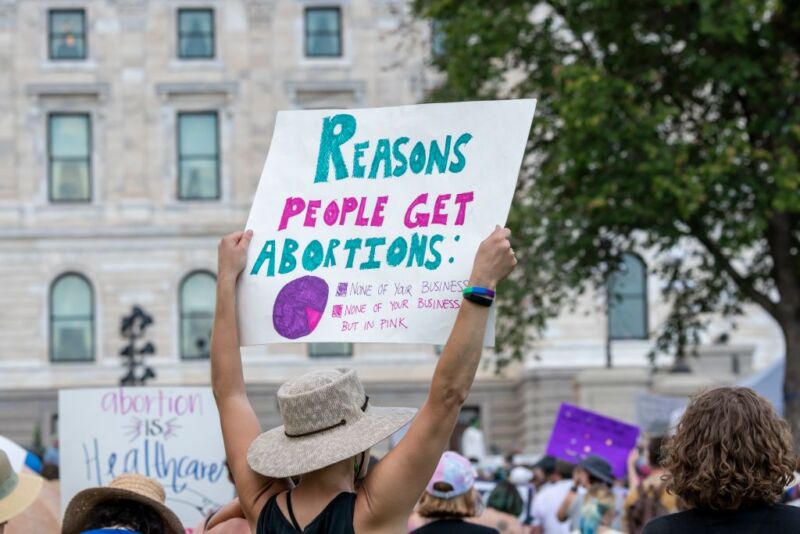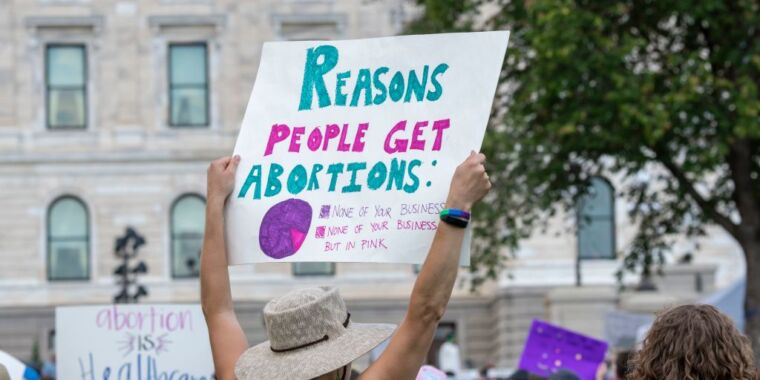
While YouTube has started deleting videos promoting false information on abortion, the South Carolina Senate introduced a new bill that strives to block Internet users from talking about abortion truthfully online.
Known as the “Equal Protection at Conception—No Exceptions—Act,” the bill would ban any website from hosting or publishing any information about accessing or self-inducing abortion “knowing that the information will be used, or is reasonably likely to be used, for an abortion.”
Specifically, the bill restricts “providing information to a pregnant woman, or someone seeking information on behalf of a pregnant woman, by telephone, Internet, or any other mode of communication.” That includes restrictions against providing abortion referral services, including to doulas performing abortions, as well as hosting or maintaining a website that’s “purposefully directed to a pregnant woman” living in South Carolina. Less specifically, the bill notes that further restrictions will apply once the law becomes enforced.
The law is not designed to prosecute pregnant people—the one linked here does that—but instead expands the web of punishment by targeting the people who attempt to “aid and abet” an abortion. If it’s passed, felony charges could be brought against anyone who violates, attempts to violate, or threatens to violate the law by a range of stakeholders, including the state attorney general, solicitors, the father or grandparents of the unborn child, or the parents or legal guardians of pregnant minors. The punishment for the crime is the same for anyone who performs or induces abortion “knowingly or intentionally”: imprisonment “for not more than 25 years if the unborn child dies as a result of the violation” or “not more than 20 years if the unborn child is born alive despite the violation.”
In addition to these restrictions, the bill paints abortion providers as an organized crime syndicate that must be regulated as such and abortion pills as a street drug that senators predict will be trafficked like fentanyl.
No one’s sure yet if the bill will stand, even if it manages to get through the state legislature and to South Carolina Governor Henry McMaster’s desk to sign. Wired reported that any states restricting access to abortion pills would face challenges from the Food and Drug Administration, which has defended the legality of mail-ordering pills. And President Joe Biden says that pharmacies not filling abortion pill prescriptions violate civil rights laws. There are also First Amendment concerns. The Washington Post reported that “there’s broad uncertainty about how courts would interpret such bills,” but legal scholars say that regardless, the South Carolina bill will likely be “a harbinger of other state measures, which may restrict communication and speech as they seek to curtail abortion.” The bill notes that if any section is deemed unconstitutional, the rest of the sections will remain valid unless also successfully challenged in court.
McMaster and state senators sponsoring the bill did not immediately respond to Ars’ requests for comment. Because the legislation is not yet active, a spokesperson for online civil rights nonprofit Electronic Frontier Foundation tells Ars that they do not yet have an official position on the bill.
Proposed abortion laws broaden political divide
SC’s proposed “No Exceptions” Act is the most recent in a dizzying array of proposed laws seeking to regulate abortion more stringently since the Dobbs decision. Some states, like Louisiana, tried and failed to make abortion punishable by death, while Republicans in Idaho announced their party platform wouldn’t make abortion exceptions for pregnant people whose lives become endangered. The Washington Post reported that more Republicans are ready to do away with rape or incest exceptions, too.
A recent viral tweet also caused a stir by calling attention to a stalled North Carolina bill introduced last year that declared abortion would be treated like first-degree murder, punishable by death, and made provisions so that lethal force could be used to prevent someone from seeking an abortion. That’s seemingly not a looming reality right now, but it does show how extreme proposed laws can go to disregard the life of the pregnant person when restricting abortion.
Meanwhile, Congress is currently debating the “My Body, My Data Act” introduced last month, which attempts to restrict companies from sharing reproductive health data that could serve as evidence in states enforcing stricter regulations. Last month, President Biden said he would also support making an exception to the filibuster so that Democrats could more easily pass legislation protecting abortion access nationwide.








